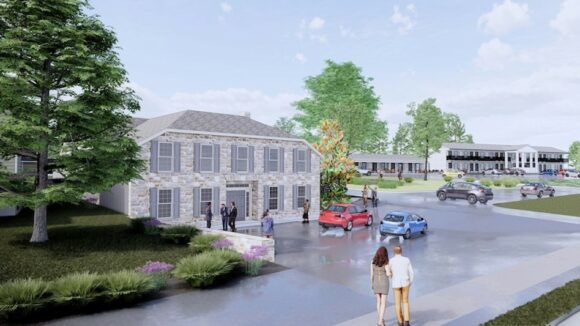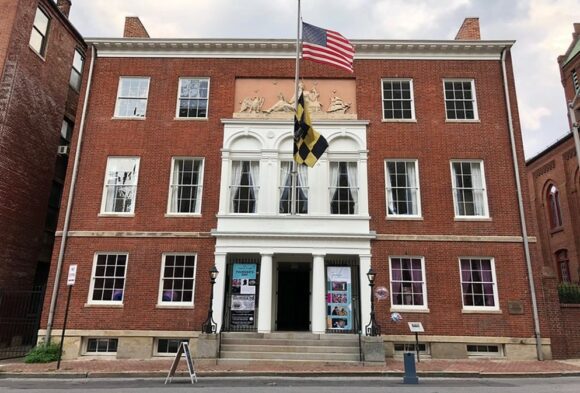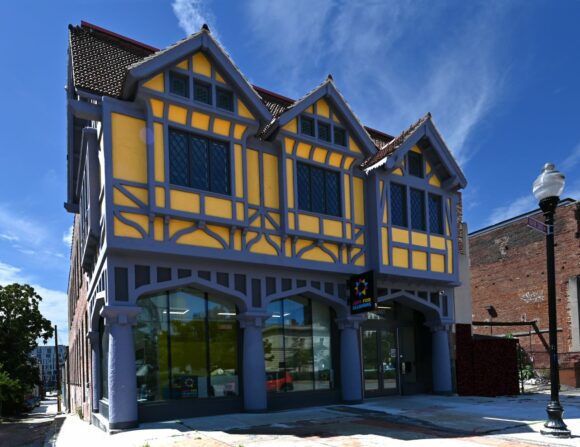Dr. Pepper Bottling Plant
54
Jobs Created
$793,278
Tax Impact
$2,248,099
Income Generated
$3,054,556
GDP Added
$5,992,381
Output Generated
The Dr. Pepper Bottling Plant in Raleigh, North Carolina, was first established in 1935, in what is now called the Depot Historic District. Operating for nearly 40 years, the bottling plant was one of many products to come out of the arrival of the railroad. The building also had a life in auto repair, as the home of Tires N Parts for several decades. The building eventually became vacant and fell into disrepair until Empire Properties, a full-service real estate development company committed to the redevelopment and historic preservation of downtown Raleigh, took on a full renovation in 2013. Through the Historic Rehabilitation Tax Credit (HTC), the historic Dr. Pepper Bottling Plant is now home to Personify, a highly-accredited executive recruiting firm with a unique commitment to supporting the growth and wellbeing of the downtown Raleigh community.
A Brief History
Originally built in 1935, the Dr. Pepper Bottling Plant served as a contributing resource to Raleigh’s Depot Historic District for nearly 40 years until it closed in 1972. The introduction of the railroad in 1870 served as a catalyst for economic and architectural growth in the region, allowing the Depot Historic District to truly take shape and prosper. The district features a number of historically significant buildings dating back as early as 1894. Along with the other buildings located in the district, the Dr. Pepper Bottling Plant exhibits popular architectural elements of the American Craftsmen style from the late 19th and early 20th centuries. Influenced by the Arts & Crafts movement in England, which rejects the heavy ornament of Victorian décor, the Craftsmen style showcases artisan skill and the inherent beauty of materials through clean, simple lines.
About the Rehabilitation
The original building featured clustered brick pilasters flanking the south bay of the facade, large plate glass display windows, an extensive factory space to the rear and a low, one-story wing with two garage doors recessed from the street on the north side. During rehabilitation, the large glass plate windows on the exterior and the historic rolled aluminum storefront were restored and repainted, the iron-spot brick was cleaned and repaired, and new glass rollup doors were installed in the masonry openings that used to open the loading docks. On the interior, concrete floors were restored or repoured as necessary, a new roof was installed, and an interior mezzanine was built to extend off of the second-story syrup room providing a full-height connection between the entry level and the upper story. The original wooden staircase was preserved with the addition of new steel hand and guardrails, along with the warehouse’s 20-foot tall, vaulted ceiling now exposed over the open-office design. To complete the project, a new reception, break area and conference rooms were built to accommodate the needs of a new tenant.
About Personify
Personify is one of the fastest-growing privately held Recruitment Process Outsourcing (RPO) and Traditional Search organizations in the U.S., delivering strategic talent solutions to clients of all sizes across the globe. In 2016, Personify moved its headquarters to the rehabilitated Dr. Pepper Bottling Plant in Raleigh, North Carolina. With a dedication to providing world-class, customizable talent management services backed by industry expertise and data-driven analytics, the firm successfully transitioned from a local staffing firm to one of the best-performing recruiting agencies in the nation. Over its lifetime, Personify has acquired a great deal of praise and recognition for its innovative, people-centric business model. Accolades include:
- HRO Today, Baker’s Dozen Customer Satisfaction Ratings, 2017, 2018, 2019, 2020
- Inc. Magazine, Best Workplaces in the U.S., 2018
- Inc. Magazine, 5000 Fastest-Growing Private Companies, 2015, 2016, 2017
- Triangle Business Journal, Best Places to Work in the Triangle, 2015, 2016, 2017
Community Impact
The rehabilitation of Raleigh’s historic Dr. Pepper Bottling Plant brought new life to the Depot Historic District. The project not only preserves a unique piece of American history, but it inspires the rehabilitation of other historic properties in the area, supporting the comprehensive revitalization of the entire downtown Raleigh community. The building’s tenant, Personify, adds remarkable value to the local area through their Community Outreach Committee, planning company-wide days of service, and ensuring regular volunteer opportunities are in place for employees to give back. From their participation in the Downtown Raleigh Alliance’s First Friday Artwalk to their partnership with the Triangle Diversity Business Council, Personify supports the ongoing growth and advancement of Raleigh’s Depot Historic District.
About the Developer

Empire Properties began its work in 1995 with the rehabilitation of a single warehouse in downtown Raleigh, North Carolina. Today, Empire’s portfolio of over 40 buildings and 800,000 square feet in Raleigh and Durham meets the needs of modern tenants without sacrificing the sense of place and history that old buildings provide. Indeed, much of Empire’s success has been built on the use of historic tax credits—Empire has completed twelve tax credit projects in the last twelve years with over $50MM in qualified rehabilitation expenditures made. Empire—which has grown to be a development, construction, brokerage, property management and restaurant company—continues to find opportunities in challenging conditions and takes pride in delivering high-quality, customized spaces and experiences for tenants.
Project Type:
Historic RehabilitationAddress:
416 South Dawson Street
Raleigh, North Carolina 27601


